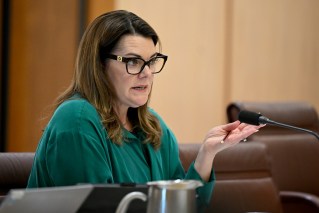Challenges loom large for new Albanese government

Anthony Albanese’s tense relationship with the media as Opposition Leader still gets him going but has proved surprisingly helpful early in his prime ministership.
No task is more urgent when moving into government than lowering people’s expectations. And a source said tough press during the campaign had an unexpected benefit – consumers of certain media can now be pleasantly surprised by reports that the PM can touch his nose in the dark.
But members of the government say they do not need to exaggerate when discussing the challenges stretching out before them.
Treasurer Jim Chalmers has been accused of overstating – fairly – warnings of a “dire” economy but he does inherit more debt than anyone else since World War II and its aftermath. And it wasn’t Labor that said the Australian security had never been “more dangerous” over the same period.
Where others moved exuberantly into office, constraints seem to be looming larger than opportunities for many in the new government.
Interest rates and inflation

Jim Chalmers says Australia faces a “perfect storm” of economic hits. Photo: AAP
An interest rate rise during an election campaign made news last month, but it was a rise on Tuesday that presented a real political moment and sign of trouble for the government.
The bank hinted at expedited further rises and echoed warnings from the Treasurer about significantly increased inflation. Annualised price rises are now likely to be closer to 7 per cent than the 5.1 per cent forecast.
The cash rate hitting a forecast 2.5 per cent would add more than $600 to median monthly repayments. Rates have only dropped since 2010.
Such a squeeze is always politically risky but ups the government’s exposure on its cost-of-living response, the issue it called a “crisis”. Double-digit increases to power bills next month now figure alongside rising prices, rates and falling wages – what it had called a “triple whammy”.
A central problem for Dr Chalmers is that the government can only do so much. Much of these price rises are being driven overseas; energy costs in advanced economies around the world rose one-third over a year though local factors contributed.
A national meeting on the energy market will be held on Wednesday amid calls for subsidies but no obvious solution that can be effected in time for winter’s end. Modernising the electricity grid is necessary but won’t drop current prices.
Government cost-of-living responses risk compounding inflation or soon being superseded. Recent support for a pay rise for low-income workers of 5.1 per cent is behind the pace and it’s not clear how real wages can catch up now.
“The real risk is doing too much,” says a senior government source who points to Britain and says cost-of-living measures invariably disappoint voters and can fatally preoccupy governments.
More measures have been promised in the next budget.
Budget repair everywhere
One of the many ways in which the pandemic upended the natural order of politics was the apparent readiness with which voters dispensed the Coalition despite an unprecedented expansion in government outlays on financial support.
Its post-pandemic budget even offered some sweeteners to offset the phasing out of its pandemic budget sweeteners. The new government says it must clean up the mess – up to a point.

Labor must address pandemic blowouts in aged care, defence and the NDIS.
The government could reform taxation to solve a structural deficit. It won’t, though. And so blowouts in defence, aged care and the NDIS will either eat into its own agenda or its promised repair-job. It also forgoes $22 billion a year in stage three tax cuts it has adopted from the Coalition.
Spending cuts and tax concessions combine to create a challenge more existential than fiscal.
Professor John Quiggin from the University of Queensland argues Labor seems to have won power only to see that “lower to lower middle income earners get screwed, and the money goes to the rich”.
Mr Albanese’s boosters say difficult conditions are perfect for a strategy of winning two terms and delivering reform like his childcare scheme across them.
Balancing act
The Prime Minister comes to government keenly aware of what undid the party’s last stint in power, as does half of his cabinet.
“He is sitting on a broader support base than any Labor leader in a very long time,” says one source about factional dynamics.
But Professor Anne Tiernan, a political scientist at Griffith University who studied Kevin Rudd’s transition, says the new PM’s political style is balanced too.
“Albanese is running a traditional Hawke-style cabinet, something very different from the highly centralised model that Morrison ran and that, dispositionally, became Kevin Rudd’s habit.”
Dr Tiernan says Labor had long prepared to make a modernised public service and Parliament anchors for the new government.
But exercising power on areas such as industrial relations and climate policy will be tricky no matter the preparations. An incoming class of radical Greens MPs will add to this challenge when wielding the balance of power in the Senate.
Industrial relations presents technical and philosophical challenges like balancing business’ need for migration with its impact on unemployment.
A vaunted summit bringing together unions and business will also pose delicate questions. In the early ’80s this approach under Bob Hawke secured wage rises in a high inflation environment. But it also delivered productivity gains (and enterprise bargaining changes).
Restarting long-stalled productivity reform on common ground for workers and bosses by September is ambitious scheduling.
But as the legendary Macmillan quote has it, the real challenges are unforeseen – nothing can interrupt a government’s plans like an event.








